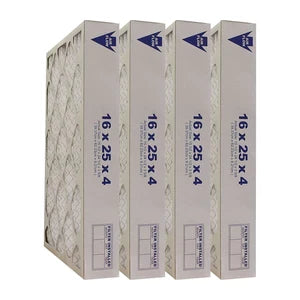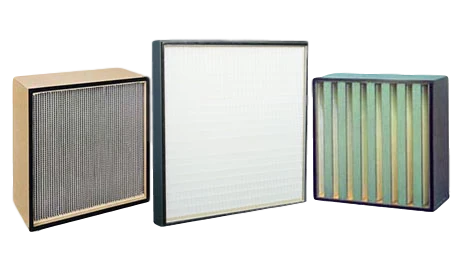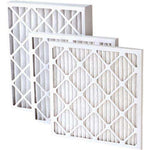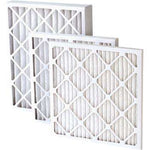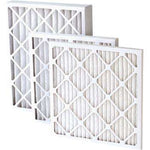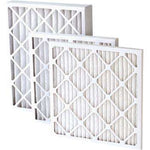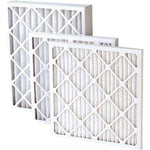You have no items in your shopping cart.
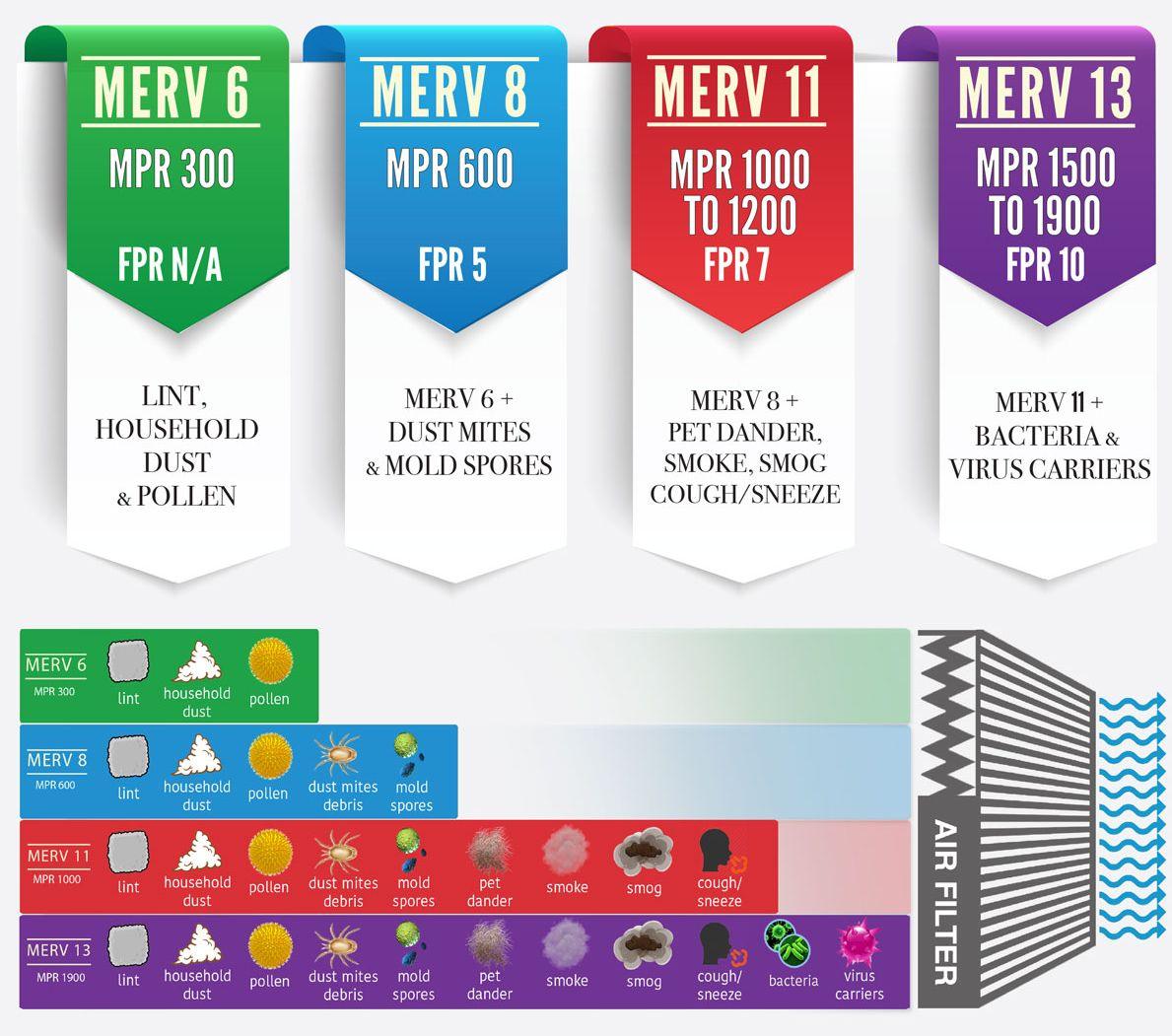
MERV Filter Ratings 101: What They Are and How They Affect Indoor Air Quality
Are you planning to replace your HVAC filters but wondering what MERV rating means?
Picking the right HVAC filters is an important process to ensure smooth airflow in your house.
This guide aims to answer all your questions, regarding MERV rating, starting with what is MERV rating, and guiding you through the process of picking the right HVAC filters for your home.

What Does MERV Rating Stand For?
So, what is MERV rating?
MERV rating is an abbreviation for Minimum Efficiency Reporting Value.
A MERV rating tells you, on a scale of 1-20, how effectively your filter traps the small particles you don’t want circulating through your home.
The higher a MERV rating, the smaller the particles the filter traps.
Does this mean you should always pick a higher HVAC rating?
Not at all!
It all depends on your air quality needs and your HVAC system’s capacity.
Quick MERV Rating Comparison Chart
|
MERV RATING |
Captures… |
Typical Use |
|
1-4 |
Large particles such as dust mites, pollen, insects, and their waste (some), carpet fibers. |
Basic residential HVAC systems |
|
5-8 |
Captures finer dust particles, pet dander, spray particles, aerosol spray particles, mold spores |
Best for homes with pets |
|
9-12 |
Auto and welding fumes, lead dust, fine dust, and larger bacteria |
Common in some hospital labs and commercial buildings, allergy-prone households, etc. |
|
13-16 |
Smoke particles, sneeze droplets, large range of bacteria, oil droplets |
Common in hospital surgical centres, smoking lounges, and any other area that requires heavy filtration |
|
17-20 |
Best for viruses, bacteria, radioactive particles, and tiny smoke particles, carbon dust. |
Typically used in hospitals, labs, clean rooms where drugs and sensitive electronics are produced. |

Choosing the Right MERV Filter
Now that you know the common types of HVAC filters available, how do you know which is ideal for your specific case?
These tips will help:
1. Local Air Environment
How’s the air quality in your locality?
If you live near construction sites, areas prone to wildfires or pollution, higher MERV ratings of between 11-13 will be ideal.
2. Pets
If you’ve pets in your house, go for filters with a MERV rating of 5-8, as this is ideal for trapping dander and pet hair.
3. Allergies
Another factor to consider is the health status of people living in your house.
If someone in your household suffers from respiratory issues, such as asthma, choose a higher MERV rating (9-12 or 13-16)
4. Your HVAC system compatibility
Of course, you must ensure that your MERV filters match your HVAC system.
Incompatible MERV filters can slow down airflow in your system, making it less efficient. If unsure, consult the manufacturer's manual or reach out to us.
It’s also important to note that higher MERV filters may require to be replaced more often than their lower MERV counterparts.
This is because they trap more particles, clogging the system more often.
Think of all these things before going out to buy your next MERV filters.
So should I buy filters with high MERV ratings?
You’d prefer a 5-star hotel to a 2-star hotel, but should you prefer a filter with a MERV rating of 16 to one with a rating of 9? Probably not.
If your filter has a high MERV rating, you know it’s highly effective in preventing things like pollen, bacteria and pet dander from circulating throughout your home.
However, it may be overly effective in preventing air itself from circulating, which is a bad thing.
The end result of less air circulation may be poorer overall air quality in your home.
Furthermore, more resistance means more work for your HVAC system.
If you’re using a filter with a MERV rating that’s not compatible with your system, inefficiency and high energy costs may be the result.
Over the long term, if your HVAC system becomes overworked, you may be faced with costly repairs.
What MERV Rating Should My Filter Have?
The answer to this question will vary based on your HVAC system, but generally, aiming for a MERV rating between 8 and 13 is ideal for the typical home.
Remember, you should make sure your filter and your system work in harmony.
Filters with high MERV ratings may remove more harmful contaminants from your home, but they may actually reduce the quality of the air you breath if you select a filter with a MERV rating that’s too high for your HVAC system.
If three families had identical HVAC systems in their homes that were compatible with filters that have a variety of MERV ratings, should they all be using the same type of filter?
Once again, it depends.
If still unsure which MERV rating to choose, consider these scenarios:
Household 1
Perhaps one household is composed of two newlyweds who are working hard to jumpstart their careers.
They have no time for pets, neither of them smoke,s and they rarely have guests over.
They select an air filter with a MERV rating of 8. There are only two of them, they have no allergies, they don’t smoke and don’t often have guests over to bring in dust and dirt.
Household 2
A family of five resides in the second household. The children are between the ages of 8 and 15. They’re all healthy kids who are into sports, and their parents enjoy hosting team dinners for each of their children, who have friends over often, either way.
They also have a young lab. They select an air filter with a MERV rating of 11.
No one in this family suffers from a breathing condition that would warrant buying a filter with a higher MERV rating, but more dirt, dust, and other contaminants find their way into this home every time they have guests over.
Lucy the lab joins the guests and family members themselves in churning up these contaminants within their home, and she leaves behind pet dander.
They need an air filter that traps a few more particles than our first household, but they don’t need the highest level of protection.
Household 3
Finally, a family of six lives in the third household.
Everyone chips in to take care of Grandma, who lives with them, and has emphysema.
They don’t have any pets because the children seem to have the same allergies that their grandmother does, but they occasionally host friends and family.
They select an air filter with a MERV rating of 13.
Because most of the family members have allergies and the grandmother has a severe breathing problem, and because there are six people bringing contaminants in as opposed to one or two, a relatively high MERV rating is in their best interest.
Do some research about your system to find out what MERV rating is ideal for you. And, don’t forget to change your filters, otherwise the MERV rating will be the least of your worries!

Frequently Asked Questions
1. What is MERV rating, and why is it important?
MERV ratings indicate how well a filter removes airborne particles. A higher rating offers better protection against pollutants and allergens.
However, it can restrict airflow if your system isn’t designed for it. Always consult your manufacturer’s manual.
2. What’s the best MERV rating for allergies?
MERV 11-13 is often considered the optimal range. This is because these filters can trap dust, pollen, mold spores and pet dander, which are common triggers for allergy patients.
3. Should I always go for a higher MERV rating?
While a higher MERV rating can trap a wide range of finer contaminants, it’s not always better.
This is because they can reduce airflow and strain your HVAC system. Always match the filter to your system’s specifications.
4. How can I tell if my filter is too restrictive for my HVAC system?
One way to tell if your filter isn’t working for your HVAC system is if your energy bill suddenly spikes up after installing the new filters.
Additionally, if airflow appears to be weaker after your system has been running for longer, it may be an indication that your filter does not match your system.
MERV Filter Ratings 101: What They Are and How They Affect Indoor Air Quality
Are you planning to replace your HVAC filters but wondering what MERV rating means?
Picking the right HVAC filters is an important process to ensure smooth airflow in your house.
This guide aims to answer all your questions, regarding MERV rating, starting with what is MERV rating, and guiding you through the process of picking the right HVAC filters for your home.

What Does MERV Rating Stand For?
So, what is MERV rating?
MERV rating is an abbreviation for Minimum Efficiency Reporting Value.
A MERV rating tells you, on a scale of 1-20, how effectively your filter traps the small particles you don’t want circulating through your home.
The higher a MERV rating, the smaller the particles the filter traps.
Does this mean you should always pick a higher HVAC rating?
Not at all!
It all depends on your air quality needs and your HVAC system’s capacity.
Quick MERV Rating Comparison Chart
|
MERV RATING |
Captures… |
Typical Use |
|
1-4 |
Large particles such as dust mites, pollen, insects, and their waste (some), carpet fibers. |
Basic residential HVAC systems |
|
5-8 |
Captures finer dust particles, pet dander, spray particles, aerosol spray particles, mold spores |
Best for homes with pets |
|
9-12 |
Auto and welding fumes, lead dust, fine dust, and larger bacteria |
Common in some hospital labs and commercial buildings, allergy-prone households, etc. |
|
13-16 |
Smoke particles, sneeze droplets, large range of bacteria, oil droplets |
Common in hospital surgical centres, smoking lounges, and any other area that requires heavy filtration |
|
17-20 |
Best for viruses, bacteria, radioactive particles, and tiny smoke particles, carbon dust. |
Typically used in hospitals, labs, clean rooms where drugs and sensitive electronics are produced. |

Choosing the Right MERV Filter
Now that you know the common types of HVAC filters available, how do you know which is ideal for your specific case?
These tips will help:
1. Local Air Environment
How’s the air quality in your locality?
If you live near construction sites, areas prone to wildfires or pollution, higher MERV ratings of between 11-13 will be ideal.
2. Pets
If you’ve pets in your house, go for filters with a MERV rating of 5-8, as this is ideal for trapping dander and pet hair.
3. Allergies
Another factor to consider is the health status of people living in your house.
If someone in your household suffers from respiratory issues, such as asthma, choose a higher MERV rating (9-12 or 13-16)
4. Your HVAC system compatibility
Of course, you must ensure that your MERV filters match your HVAC system.
Incompatible MERV filters can slow down airflow in your system, making it less efficient. If unsure, consult the manufacturer's manual or reach out to us.
It’s also important to note that higher MERV filters may require to be replaced more often than their lower MERV counterparts.
This is because they trap more particles, clogging the system more often.
Think of all these things before going out to buy your next MERV filters.
So should I buy filters with high MERV ratings?
You’d prefer a 5-star hotel to a 2-star hotel, but should you prefer a filter with a MERV rating of 16 to one with a rating of 9? Probably not.
If your filter has a high MERV rating, you know it’s highly effective in preventing things like pollen, bacteria and pet dander from circulating throughout your home.
However, it may be overly effective in preventing air itself from circulating, which is a bad thing.
The end result of less air circulation may be poorer overall air quality in your home.
Furthermore, more resistance means more work for your HVAC system.
If you’re using a filter with a MERV rating that’s not compatible with your system, inefficiency and high energy costs may be the result.
Over the long term, if your HVAC system becomes overworked, you may be faced with costly repairs.
What MERV Rating Should My Filter Have?
The answer to this question will vary based on your HVAC system, but generally, aiming for a MERV rating between 8 and 13 is ideal for the typical home.
Remember, you should make sure your filter and your system work in harmony.
Filters with high MERV ratings may remove more harmful contaminants from your home, but they may actually reduce the quality of the air you breath if you select a filter with a MERV rating that’s too high for your HVAC system.
If three families had identical HVAC systems in their homes that were compatible with filters that have a variety of MERV ratings, should they all be using the same type of filter?
Once again, it depends.
If still unsure which MERV rating to choose, consider these scenarios:
Household 1
Perhaps one household is composed of two newlyweds who are working hard to jumpstart their careers.
They have no time for pets, neither of them smoke,s and they rarely have guests over.
They select an air filter with a MERV rating of 8. There are only two of them, they have no allergies, they don’t smoke and don’t often have guests over to bring in dust and dirt.
Household 2
A family of five resides in the second household. The children are between the ages of 8 and 15. They’re all healthy kids who are into sports, and their parents enjoy hosting team dinners for each of their children, who have friends over often, either way.
They also have a young lab. They select an air filter with a MERV rating of 11.
No one in this family suffers from a breathing condition that would warrant buying a filter with a higher MERV rating, but more dirt, dust, and other contaminants find their way into this home every time they have guests over.
Lucy the lab joins the guests and family members themselves in churning up these contaminants within their home, and she leaves behind pet dander.
They need an air filter that traps a few more particles than our first household, but they don’t need the highest level of protection.
Household 3
Finally, a family of six lives in the third household.
Everyone chips in to take care of Grandma, who lives with them, and has emphysema.
They don’t have any pets because the children seem to have the same allergies that their grandmother does, but they occasionally host friends and family.
They select an air filter with a MERV rating of 13.
Because most of the family members have allergies and the grandmother has a severe breathing problem, and because there are six people bringing contaminants in as opposed to one or two, a relatively high MERV rating is in their best interest.
Do some research about your system to find out what MERV rating is ideal for you. And, don’t forget to change your filters, otherwise the MERV rating will be the least of your worries!

Frequently Asked Questions
1. What is MERV rating, and why is it important?
MERV ratings indicate how well a filter removes airborne particles. A higher rating offers better protection against pollutants and allergens.
However, it can restrict airflow if your system isn’t designed for it. Always consult your manufacturer’s manual.
2. What’s the best MERV rating for allergies?
MERV 11-13 is often considered the optimal range. This is because these filters can trap dust, pollen, mold spores and pet dander, which are common triggers for allergy patients.
3. Should I always go for a higher MERV rating?
While a higher MERV rating can trap a wide range of finer contaminants, it’s not always better.
This is because they can reduce airflow and strain your HVAC system. Always match the filter to your system’s specifications.
4. How can I tell if my filter is too restrictive for my HVAC system?
One way to tell if your filter isn’t working for your HVAC system is if your energy bill suddenly spikes up after installing the new filters.
Additionally, if airflow appears to be weaker after your system has been running for longer, it may be an indication that your filter does not match your system.
